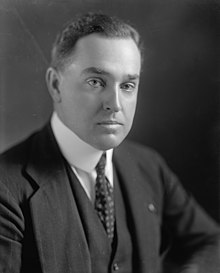| John Philip Hill | |
|---|---|
 Hill (c. 1905) Hill (c. 1905) | |
| Member of the U.S. House of Representatives from Maryland's 3rd district | |
| In office March 4, 1921 – March 3, 1927 | |
| Preceded by | Charles P. Coady |
| Succeeded by | Vincent L. Palmisano |
| Personal details | |
| Born | John Boynton Philip Clayton Hill (1879-05-02)May 2, 1879 Annapolis, Maryland, U.S. |
| Died | May 23, 1941(1941-05-23) (aged 62) Washington, D.C., U.S. |
| Resting place | Arlington National Cemetery Arlington, Virginia, U.S. |
| Political party | Republican |
| Spouse |
Suzanne Howell Carroll
(m. 1913) |
| Alma mater | Johns Hopkins University (AB) Harvard Law School (LLB) |
| Occupation |
|
John Boynton Philip Clayton Hill (May 2, 1879 – May 23, 1941) was a U.S. representative from the 3rd Congressional district of Maryland, serving three terms from 1921 to 1927.
Early life
John Boynton Philip Clayton Hill was born on May 2, 1879, in Annapolis, Maryland, to Kate Watts (née Clayton) and Charles Ebenezer Hill. He attended common schools and graduated from Johns Hopkins University in 1900 with a Bachelor of Arts. He graduated from Harvard Law School in 1903 with a Bachelor of Laws. He was admitted to the bar in Boston in 1903 and commenced practice in Boston, Massachusetts, in the office of Ropes, Gray & Gorman.
Career
Hill returned to Baltimore, Maryland and was admitted to the bar in Boston in 1904. He then practiced law there. Hill was a candidate for the 12th ward in the Maryland House of Delegates in 1905. He was a candidate for the 2nd ward in the House of Delegates in 1907. Hill was an unsuccessful candidate for election to the Sixty-first Congress in 1908. He served as United States Attorney for the district of Maryland from 1910 to 1915. In 1915, Hill was an unsuccessful candidate for mayor of Baltimore, and served as delegate to the Republican National Convention in 1916. He served as judge advocate for the Fifteenth Division, and attached to the Fourteenth Cavalry, Mexican border service, from August 26 to December 15, 1916. Hill also practiced law with Hill, Ross & Hill. During the First World War, he was major and lieutenant colonel in the United States Army in 1918 and 1919.
After the war, Hill was elected as a Republican to the Sixty-seventh, Sixty-eighth, and Sixty-ninth Congresses, serving from March 4, 1921, to March 3, 1927. To date, he is the last Republican to represent a significant portion of Baltimore in the House. He was an unsuccessful candidate for the United States Senate in 1926, an unsuccessful candidate for election in 1928 to the Seventy-first Congress, and again in 1936 to the Seventy-fifth Congress. Hill moved to New York City in 1937 and continued the practice of law until he returned to Annapolis in 1940.
Hill was the only representative from Maryland, and one of only 62 House members, to vote against the 1924 Johnson-Reed Act, the law that placed severe quotas on immigration to the United States
During Prohibition, Hill planted some grape vines and apples trees in his yard, and renamed his house "Franklin Farms", since farmers were allowed to make wine and cider. He was arrested and charged with the illegal manufacture of liquor, but the jury pronounced it "not intoxicating in fact", even though its alcohol content was more than 12%.
Personal life
Hill married Suzanne Howell Carroll, the great-great-great granddaughter of Charles Carroll of Carrollton, on October 28, 1913.
Hill died in Washington, D.C., and is interred in Arlington National Cemetery.
References
- ^ "Hill, John Boynton Philip Clayton". Biographical Directory of the United States Congress. Retrieved 2022-12-06.
- ^ Distinguished Men of Baltimore and of Maryland. Baltimore American. 1914. p. 59. Retrieved 2022-12-06 – via Archive.org.
- "TO AGREE TO THE REPORT OF CONFERENCE COMMITTEE ON H.R. 7995, TO LIMIT THE IMMIGRATION OF ALIENS INTO THE UNITED STATES. (P. 8651-1)". Retrieved 10 September 2021.
- Cottom, Ric (2017). Your Maryland: Little-Known Histories from the Shores of the Chesapeake to the Foothills of the Allegheny Mountains. JHU Press. p. 146. ISBN 9781421424064. Retrieved 23 September 2018.
- United States Congress. "John Philip Hill (id: H000597)". Biographical Directory of the United States Congress. Retrieved on 2009-02-22
External links
 Media related to John Boynton Philip Clayton Hill at Wikimedia Commons
Media related to John Boynton Philip Clayton Hill at Wikimedia Commons
| U.S. House of Representatives | ||
|---|---|---|
| Preceded byCharles P. Coady | Maryland's 3rd congressional district 1921–1927 |
Succeeded byVincent L. Palmisano |
| Maryland's delegation(s) to the 67th–69th United States Congresses (ordered by seniority) | ||||||||||
|---|---|---|---|---|---|---|---|---|---|---|
| ||||||||||
This article about a Maryland politician is a stub. You can help Misplaced Pages by expanding it. |
- 1879 births
- 1941 deaths
- United States Army personnel of World War I
- United States Army officers
- Burials at Arlington National Cemetery
- Johns Hopkins University alumni
- Harvard Law School alumni
- United States Attorneys for the District of Maryland
- Politicians from Annapolis, Maryland
- Military personnel from Maryland
- Republican Party members of the United States House of Representatives from Maryland
- 20th-century members of the United States House of Representatives
- Maryland politician stubs